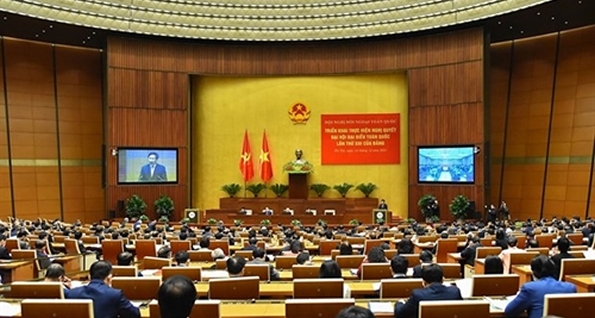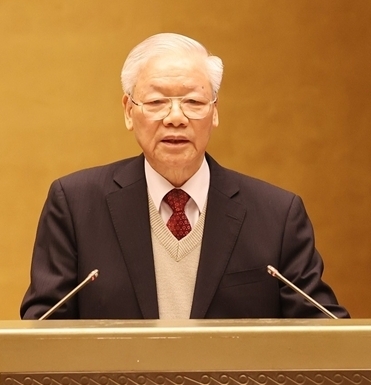
| No. 2 | February 6, 2022 |
|
CONTENTS - Pauline Easton - • Divisive
Self-Serving Stunts and Disinformation of the • Blockade of Alberta-Montana Border • Truckers Provide Facts to Counter "Freedom Convoy" Disinformation - Normand Chouinard -
•
Alberta
Premier Kenney Attends National Governors • The Problem of Orphaned Oil and Gas Wells - K.C. Adams - • Links of BC Rare Earth Mining Project to U.S. War Economy - Fernand Deschamps -
NATO's Friends of Women, Peace and Security Group • Canada's Machiavellian Position on Women - Peggy Morton -
• U.S. and Allies Ramp Up Lethal Weapons Shipments to Ukraine • Criminal U.S. Raid Against Syria
Communist Party of Brazil •
Red Salute to Longtime Fighter for
Democratic Rule in Brazil!
• Long Live Revolutionary Vietnam on Its 92nd Anniversary! • Vietnam's Principled and Constructive Foreign Policy - Philip Fernandez - "Freedom Convoy" in Ottawa Anarchy Breeds Violence
The narrow supranational private interests behind the so-called
"Freedom Convoy" that is making a nuisance of itself in Ottawa and
other cities and provinces have lowered the level of culture to one
word expletives and are doing their utmost to instill confusion and
fear. This is facilitated by the authority which exists at the federal and provincial levels which is self-serving. Any consideration for the well-being of the people and the polity has been replaced with self-serving cartel party posturing and in-fighting. These have degenerated to such an extent that epithets hurled at one another and the peoples who are fighting for their rights have supplanted political discourse. It shows what happens when retrogression is imposed and gives rise to anarchy and violence. This is not the answer to the all-round crises facing Canada and the world.
Anarchy goes hand in hand with violence because the methods used to sort out conflicts within the ranks of the rulers, such as elections, no longer achieve that aim.Resorting to the use of force is the only alternative the ruling class knows but when it comes to the blatant violations of law and order by goons calling themselves a freedom convoy in Ottawa, there has been a marked reluctance to use it. Ottawa City Council has now declared a state of emergency. The ordinance does not provide police with increased powers or call in the military but does show the reluctance of the ruling class to use law and order measures when it is a matter of the contradictions within its own ranks. The Trudeau government went out of its way to say it defends freedom of speech and to protest so long as it is law-abiding but everyone can see that its law and order arrangements are reserved for Indigenous peoples and protestors fighting for social justice, against war and for other social and political causes, not for goons running around Ottawa in the name of freedom. It is a reminder of what took place in Washington, DC on January 6, 2021. The violent rampage against the Capitol and failed coup were called an insurrection. The Biden administration raised accusations of "sedition" and talks about laying charges of treason and the like but it has not managed to force its rivals for power to submit to its authority. And it can be predicted that the same will happen in Canada as well. It all underscores that the violence which accompanies the assertions of "freedom of speech" and to protest are inherent to the state of anarchy which has set in where various factions attempt to assert their supremacy while they unite when it comes to putting down the struggles of the people. Constitutionally speaking, the arrangements which justify the use of instruments of law and order are basically designed to mete out colonial "justice." They enforce structures which breed discrimination, misogyny and intolerance against the affirmation of the interests of workers, women and youth as well as Indigenous peoples. Those who have usurped power through their stranglehold on wealth and privilege are having trouble using these instruments of law and order against their rivals for power when neither they nor their rivals for power enjoy the support of the people. Based on unfolding events, how is what is happening to be assessed? How is the character of this historical period to be determined? Should the peoples accept that there is no alternative to the state of anarchy and violence which exists?
The interest of those who occupy the top positions of power at the federal and provincial levels is served by the preservation of the status quo. They are trying to maintain control by concentrating more and more power in the hands of the executive which is, in turn, controlled by narrow private interests. When it comes to the workers, women, youth and Indigenous peoples, they rant against those who refuse to submit to their unjust laws and violations of their rights, calling them troublemakers or this or that "ism." The workers, youth, women and Indigenous peoples are called all kinds of names in the hope that they will be blamed for the disorder. In this vein, the official media are blaming the nuisance in Ottawa on "truckers" even though it is orchestrated by private interests and has nothing to do with the claims truckers are making on society to improve their living and working conditions. The factions within the ruling class, their advisors and pundits also throw epithets at one another, accuse each other of sedition and the like. What it reveals is that the world the rulers have created for themselves is not working out for them. The conditions demand an authority which is in tune with the times, with the need to stop paying the rich, uphold the rights of all, renew the political process so that the people -- not representatives of the most narrow supranational private interests against the well-being of the peoples -- can rule and humanize the social and natural environment. The history of civilization shows us that those who profited from the status quo in any particular period always fought tooth and nail to stop the creation of a new form of society, even though the conditions were calling for it. They gave birth to outlooks that viewed the developments purely from the angle which served them. Today, such self-serving outlooks are being promoted on the world scale. Their specific feature is that they do not take into consideration the conclusions drawn from the study and analysis of the contemporary developments and what they reveal. For instance, pay-the-rich policies make the rich richer and the poor poorer and this trend is presently out of control. No matter how hard they try, the rulers are having trouble having their pay-the-rich decisions accepted by the people as good for them. So they do it more and more in secret. It is also a fact that permitting state-organized racists and fascists to organize and flourish is a matter of grave concern to society. They are fostered and backed by the highest echelons of wealth and power to cause disruption, instill fear, stage coups as in the United States. The mimicry of this is on parade in Ottawa and has the residents of the city fuming and furious. Canada's rulers and their cartel parties also appease the wars the U.S. wages abroad and try to pass the U.S. and NATO off as peaceful. The Government of Canada and the cartel parties in the federal Parliament use what are called identity politics and hurl epithets at one another to wage the factional fight among themselves and embroil the people to choose a side. They incite passions which serve to divert attention from their own corrupt rule by claiming they uphold high ideals. Their attempts to justify the dangers their appeasement of U.S. warmongering causes are reaching the limit of absurdity. So too at the provincial level, the factional fights over control of the reins of power are vicious and it is the people who pay with their lives when they are forced to fend for themselves. The rulers' law and order agenda is reserved for the people who fight, while they treat what are called white collar crimes and their own conflicts of interest with kid gloves. The crimes committed by the highest echelons including the courts against the Indigenous peoples, the working people, seniors and youth are facilitated and those committed against the peoples of the world are either attributed to corrupt leaders in their own countries, hiding the fact that they were put in place by foreign powers which benefit, or as inevitable collateral damage. The double standards and clash of outlooks which determine who and what are dispensable and who and what are indispensable is more naked than ever and have shaken the regimes which claim the superiority of the so-called liberal democratic institutions to the core. It is crucial in these circumstances that the peoples speak out against what the rulers are doing and against their self-serving excuses and failure to carry out their social responsibilities which show more than ever that they are unfit to rule.
The character of this period and what should be done is revealed by paying attention to the conditions themselves from the perspective of contributing to the advance of the society, from its present phase to the next. If this is not done, the state of anarchy and violence will lead to the grave dangers which lie inherent in blocking society's path to progress. This includes embroiling the peoples in war. Recognizing
the claims all human beings are entitled to make by virtue of being
human is the key to opening society's path to progress. Affirming the
right to be begins by affirming the right to take the decisions which
affect our lives. Fight for the Peoples! Divisive Self-Serving Stunts
and Disinformation |
| |
Another fake news that was widely promoted was in a Facebook post that spoke of a line of trucks over 490 kilometres long. That is practically the distance from Montreal to Toronto. This was then "corrected" to 100 kilometres. It was written that the convoy was going to beat the world record held by a convoy in Egypt that was 7.5 kilometres long and registered in the Guinness Book of World Records. None of it happened.
Any day of the week, there are convoys of trucks on any major highway and pictures then declare they are headed for Ottawa, or Toronto, or Quebec City. In Quebec the exaggerated figure was clearly aimed at inflaming passions and when the so-called convoy departed the number of rigs could be counted on one hand.
This is not to say that long lines of convoy supporters waving Canadian and U.S. flags and even a few confederate flags, did not travel to Ottawa. Available videos show there were more small pick-ups, SUVs and cars than heavy trucks. According to sources to date, there was a six kilometre-long convoy of vehicles at one point headed for Ottawa from Kingston and other towns in the region of eastern Ontario -- a far cry from 480 kilometres and 170,000 trucks.

Screenshot of an online
post in the British publication the Daily Mail, January
27, 2022.
This kind of hysteria carried on throughout the week. People are well-served to not pursue the social media networks which carry all this fake news on the organization and size of the so-called freedom convoy. They could easily lose their minds.
What is of significance that truckers are talking about is their living and working conditions and how decisions are taken which seriously affect their lives with no regard for them whatsoever.
According to information provided by truckers and some officials in the transportation industry, various scenarios are emerging. For some time now, even before the implementation of the federal decree mandating all truckers who cross the border be vaccinated, about which there had been rumours since last November, the fact is that many transport companies doing business in the U.S. have only been recruiting vaccinated truckers. This means that non-vaccinated truckers are forced to work only in Canada, in inter-provincial or inter-regional and local sectors. According to some sources, transportation companies will give preference to vaccinated truckers within their companies to cross the border and keep those who are unvaccinated in Canada. This is the type of change in operations that will be considered.
Another scenario is the loss of lucrative contracts for non-vaccinated independent brokers in favour of those who are vaccinated. Some say this will advantage the more vulnerable truckers who usually only get the low-end contracts. These contracts in the transport of minerals, in construction, infrastructure transport, energy, etc. are key sectors of the economy and cannot suffer any disruption in supply. There is likely to be a major upheaval in this area. Some also predict that the largest transportation companies are the ones that will benefit. Many things remain to be seen.
According to government figures, between 10 and 15 thousand drivers are not adequately vaccinated and will be forced to re-position themselves. Even though the need for transportation is currently on the rise, it can already be seen that all truckers are going to be affected by the federal decree one way or another. Far from considering all truckers dangerous and reactionary as the media is prone to suggest, with its "blame the truckers" mantra for everything from empty shelves to high prices, violence and uncouth dangerous behaviour, it is important to listen to what they have to say about their living, working and driving conditions.

Photo above,
purported to be of the Freedom Convoy, is a photograph from a
2019 truck show. Click to enlarge.
Oppose Canada's Integration into U.S. War Economy!
Alberta
Premier Kenney Attends National
Governors Meeting in
Washington, DC
Alberta Premier Jason Kenney travelled to Washington, DC to attend a meeting of U.S. Governors from January 29 to 31. Prior to his departure Premier Kenney said, "Attending the National Governors Association meeting is an excellent opportunity to discuss key issues with American leaders. I will be there to discuss growing supply chain problems, including the U.S. and Canadian governments' policies that have impacted many cross-border truckers, causing further damage to supply chains and higher prices for consumers. I will also continue to advocate for access to the U.S. market for our energy exports, including Line 5. Finally, I will be raising our concerns about growing U.S. protectionism, including the 'Buy American' initiative and softwood lumber tariffs. It's critical for Alberta's economy that we strongly advocate for our key interests with top American decision makers."
Kenney had hoped to meet with Michigan Governor Gretchen Whitmer to discuss her opposition to keeping open the Enbridge Line 5 oil pipeline. Not long ago Kenney publicly called Whitmer "brain dead" for wanting to shut down the 60-year-old pipeline from Alberta to Michigan. Line 5 travels under the Straits of Mackinac which connects Lake Michigan and Lake Huron. Reports say Whitmer refused to meet with Kenney during the Governors' conference.
Premier Kenney left Washington on January 31. No Alberta government press release or twitter announcement regarding results of the trip was issued in the usual manner.
The Alberta government did publish the following "quick facts:"
- The U.S. is Alberta's largest trading partner, and Alberta is the second-largest provincial exporter to the U.S.
- In 2020, Alberta's exports to the U.S. totalled $77.5 billion and accounted for approximately 85 per cent of total provincial exports.
- Energy products accounted for approximately $59.2 billion, 76 per cent of Alberta's exports to the U.S. in 2020.
- Bilateral trade supports nearly 1.7 million jobs. Trade with Alberta supports 906,000 jobs in the U.S. while trade with the U.S. supports 785,000 jobs in Alberta.
The Government of Alberta recently announced that it is opening three new trade and investment offices in the United States -- in Chicago, Denver and Seattle -- while expanding its office in Washington, DC.
The Problem of Orphaned Oil and Gas Wells
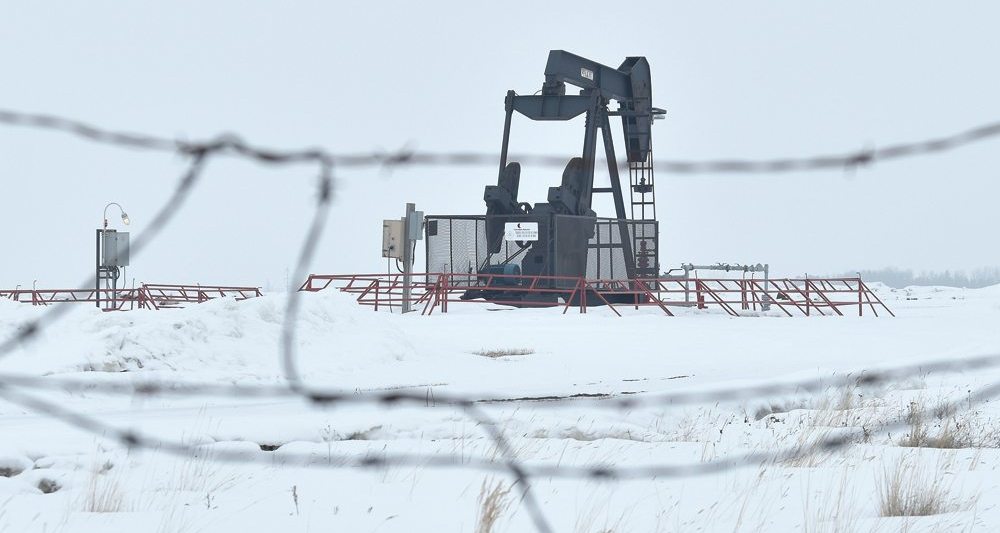
Enterprises active in the energy sector have refused to take responsibility for the mess they leave behind. The problem of orphaned oil and gas wells exposes a deep malaise within the current direction of the economy. Enterprises have blinders over their eyes and refuse to look beyond the money they make from their activities. They do not want to face the truth that the immense productivity of the modern economy brings with it not only riches in the immediate sense but responsibilities for its effects on the social and natural world.
 The modern
economy is unlike petty production of old that was mostly rural and
contained within a small area. Today the economy is large-scale and
global in scope. Modern industrial mass production and the world market
require extensive relations with other sectors and branches of the
economy at home and with peoples and economies abroad. Activity in the
modern economy greatly affects the social and natural conditions and
relations among humans and between humans and nature. All this must be
taken into account on a new modern basis. This means that those in
positions of authority in the modern economy must have a broad
consciousness of the effects enterprises have on the world.
The modern
economy is unlike petty production of old that was mostly rural and
contained within a small area. Today the economy is large-scale and
global in scope. Modern industrial mass production and the world market
require extensive relations with other sectors and branches of the
economy at home and with peoples and economies abroad. Activity in the
modern economy greatly affects the social and natural conditions and
relations among humans and between humans and nature. All this must be
taken into account on a new modern basis. This means that those in
positions of authority in the modern economy must have a broad
consciousness of the effects enterprises have on the world.
The old aim and consciousness inherited from petty production of serving oneself and the property over which someone has control and ownership are no longer suitable. In fact, the old aim has degenerated into seeking maximum profit from ownership and control regardless of the consequences of the activities of the enterprise on other parts of the economy, on human relations and on the social and natural conditions.
This is clearly evident in the reality of thousands of orphaned oil and gas wells that lie neglected by their former owners. The enterprises and government officials in authority not only have refused to hold themselves accountable for the damage they have caused and left behind but also for the refusal to adopt a modern consciousness regarding industrial mass production, which requires having an all-sided plan to humanize the social and natural conditions and infuse the economy with an aim to serve the people.
The Facts
One billion dollars is the estimate for the federal and provincial governments to clean up orphaned oil and gas wells abandoned by private enterprise. A report prepared by the federal parliamentary budget officer Yves Giroux says the $1 billion cost of cleaning up orphaned oil and gas wells in Alberta and Saskatchewan dwarfs the money collected from industry to pay for it.
| |
The report says about 10,000 wells in Alberta and Saskatchewan are currently orphaned. These wells are inactive and have no apparent operator assuming responsibility to address the environmental liabilities. Alarmingly, the report says the number of orphan wells is growing by 35 per cent a year. Enterprises active in the energy sector have put aside only $237 million in security deposits to cover environmental damage, the report says, far below what is needed.
Regan Boychuk of the Alberta Liabilities Disclosure Project denounced the report's $1 billion as "a massive underestimate and great disappointment. They left out the most expensive part." The report does not include the cost to clean up pipelines or other energy infrastructure on the land; it does not even consider oilsands' projects or the more than 7,400 wells that are abandoned but not yet considered orphaned. If those wells were included the current environmental liability would more than double.
The report also does not include any liability for 225,000 wells in Alberta and Saskatchewan that are officially inactive or plugged but not yet abandoned or orphaned by their owners. Nearly two-thirds of all wells in those provinces no longer pump, the highest percentage ever, and most wells declared inactive never start again and require immediate attention.
The Alberta Energy Regulator (AER) says the thousands of inactive wells not yet classified as abandoned or orphaned, but without any authority taking responsibility for them, are "releasing the equivalent of 545,000 tonnes of carbon dioxide every year." The AER says about 10 per cent of inactive wells and seven per cent of abandoned wells leak pollutants into the air or land. Farmers and ranchers regularly complain about poor conditions and weed control around wells, which contaminate their crops and pastures.
Critics also say the report of the federal budget officer does not include the full cost of cleanup only those expenditures associated with tidying up the land surface and removing equipment not the costs of remediating ongoing contamination from underground chemicals or leakage. The report itself acknowledges that "the exclusion of remediation will understate the total cost of well cleanup."
To add insult to injury to the public, the federal report says the government has already devoted $1.7 billion to well cleanup and half of this amount has been given to 10 "viable energy companies" including giants such as Canadian Natural Resources Ltd and Imperial Oil.
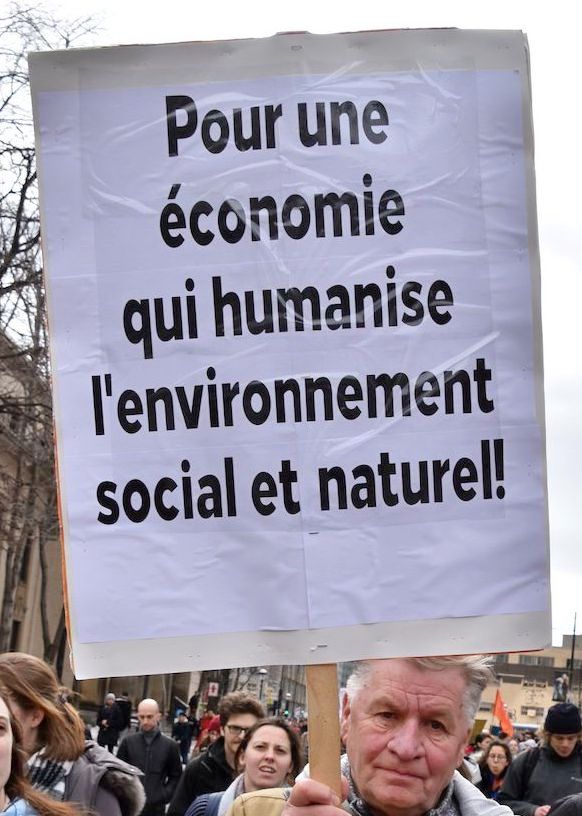 Defending the
limited conclusions of his report, budget officer Yves Giroux said,
"There isn't enough data on the highly variable costs of such cleanups
to make a meaningful estimate. The data is very limited on this. The
reclamation costs can vary greatly from one well to another."
Defending the
limited conclusions of his report, budget officer Yves Giroux said,
"There isn't enough data on the highly variable costs of such cleanups
to make a meaningful estimate. The data is very limited on this. The
reclamation costs can vary greatly from one well to another."
Critics say no number in the report can be considered "reliable, credible or defensible." For example, the report estimates the average cost of plugging and reclaiming a single well to be about $78,000, which is less than half the estimate from the Alberta Liabilities Disclosure Project.
Regan Boychuk of the Disclosure Project adds as well that the report's focus on orphan wells is "misleading." "It's not about orphans," he emphasized, when this means that all the other wells and infrastructure on the land not yet classified as orphaned are not considered an environmental threat with issues that need to be addressed immediately.
The old narrow consciousness and aim of those in positions of ownership and control are a big reason why they engage in such irresponsible practices as abandoning oil and gas wells. Their narrow aim to serve their private interests blocks the emergence of modern social practices and consciousness. Working people must oppose the outlook which sanctions this backwardness and bring into being an authority in conformity with the modern conditions.
(Photos: TML, HazMat Management, B. Glen)
Links of BC Rare Earth Mining
Project
to U.S. War Economy

Wicheeda
deposit lies within the unceded territory of the Lheidli
T'enneh. The yellow square marks approximate location of the
deposit. Click to enlarge.
The Wicheeda rare earth element (REE) property in central British Columbia is claimed by mining company Defense Metals Corporation. Defense Metals promoted the property saying, "The plan at Wicheeda is to produce the rare earths involved in defence applications; nyodemium, praseodymium, cerium and lanthanum." They note, "While the market share for light rare earth oxides (LREO) use in defence applications is small, its significance is that some rare earth minerals are essential in military equipment such as jet engines, missile guidance systems, anti-missile defence systems, satellites and lasers."
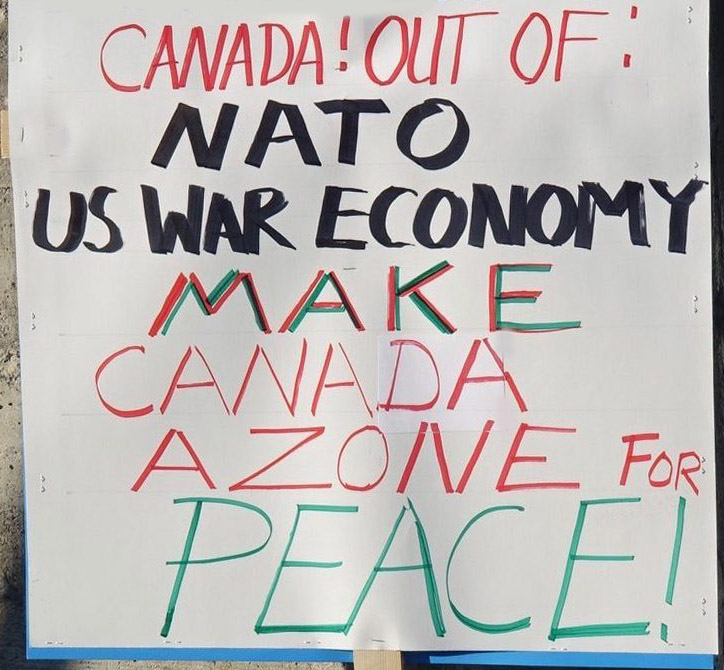 Registered on the
Canadian, U.S. and German stock exchanges, Defense Metals reports on
its website that one of its "strategic advisors" is Karl T. Wagner, "a
former member of Central Intelligence Agency (CIA)'s Senior
Intelligence Service (SIS), having served as a CIA senior leader and a
Directorate of Operations (DO) expert manager, with 29 years of
worldwide experience, including service in Latin America, East Asia,
South Asia, the Middle East and North Africa. [...] His last position
at the CIA was Chief of Counter-Intelligence (CI) Operations. He also
served as Executive Assistant to CIA's Executive Director, Chief of the
CIA's Special Middle East Task Force and in leadership positions in CIA
stations overseas including a large station in North Africa, multiple
war zones in the Middle East and South Asia, and high CI threat
stations in Latin America and East Asia."
Registered on the
Canadian, U.S. and German stock exchanges, Defense Metals reports on
its website that one of its "strategic advisors" is Karl T. Wagner, "a
former member of Central Intelligence Agency (CIA)'s Senior
Intelligence Service (SIS), having served as a CIA senior leader and a
Directorate of Operations (DO) expert manager, with 29 years of
worldwide experience, including service in Latin America, East Asia,
South Asia, the Middle East and North Africa. [...] His last position
at the CIA was Chief of Counter-Intelligence (CI) Operations. He also
served as Executive Assistant to CIA's Executive Director, Chief of the
CIA's Special Middle East Task Force and in leadership positions in CIA
stations overseas including a large station in North Africa, multiple
war zones in the Middle East and South Asia, and high CI threat
stations in Latin America and East Asia."
Another Defense Metals "strategic advisor" is Andrew Leland, a retired "U.S. Army Air Defense Officer focussed on Short Range Air Defense for eight years, [who] has participated in multiple combat tours supporting Operation Enduring Freedom and Operation Iraqi Freedom operations in Saudi Arabia, Qatar, and Iraq," and who left the service in 2006. Leland is presently a systems engineer, 3D integrated modeling specialist, at Lockeed Martin.
In one of the promotional videos on Defense Metals' website, it boasts that its Wicheeda deposit is "one of the highest-grade road-accessible deposits of rare earth elements in North America" and is located close to Prince George, "a key mining area with a trained workforce." The deposit, it says, "has the potential to reduce the existing reliance on Chinese sources" as part of "North America's safe alternative for military component production."
The Wicheeda property is located on unceded land about 80 kilometres northeast of Prince George. The promo material says the more than 2,000 hectare property "is readily accessible by all-weather gravel roads and is near infrastructure, including hydroelectric power transmission lines, a major gas pipeline, the CN railway and major highways."
The projected mine would indicate mineral resources close to 5 million tonnes averaging three per cent of total rare earth oxides (TREO) and inferred mineral resources of 29 million tonnes averaging close to two per cent TREO. Through open-pit mining, Defense Metals aims to produce an average of 25,000 tonnes of rare earth oxides (REO) per year, approximately 10 per cent of the world's current production.
The company also reported in January 2021 that 70 per cent of the estimated cost for the X-Ray transmission (XRT) test-work to determine the REE's presence in the mined ore will be done by the Saskatchewan Research Council (SRC) lab facilities, and is to be covered by funding to the company and the SRC from the National Research Council of Canada Industrial Research Assistance Program (NRC IRAP).
The NRC IRAP program is a Government of Canada funded program mandated to provide financial support for technology innovation. For example, it provides grants of up to $10 million that are typically focussed on research and development, of new innovative products, creating original software, etc. IRAP offers non-repayable financial assistance covering 80 per cent of salaries and 50 per cent of contractor costs.
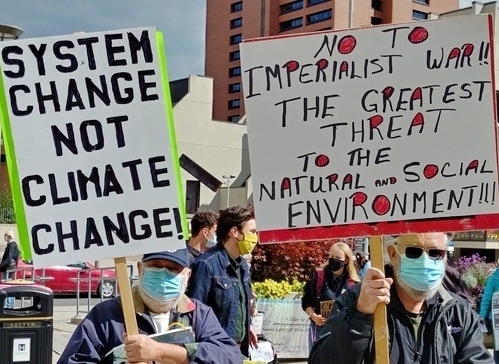 This is clearly a
straightforward pay-the-rich scheme. Never a word is spoken of how the
uses to which these elements are put benefit the people, beginning with
the Indigenous peoples on whose lands it is found, the Canadian people
and the peoples of the world. Not a word about how the natural
environment is being safeguarded for present and future generations.
Canadians of course never gave approval for natural resources to be
used in war production, which is carried out under the guise of high
ideals.
This is clearly a
straightforward pay-the-rich scheme. Never a word is spoken of how the
uses to which these elements are put benefit the people, beginning with
the Indigenous peoples on whose lands it is found, the Canadian people
and the peoples of the world. Not a word about how the natural
environment is being safeguarded for present and future generations.
Canadians of course never gave approval for natural resources to be
used in war production, which is carried out under the guise of high
ideals.
Commenting on the SRC/NRC investment, Defense Metals CEO Craig Taylor said at the time, "We are [the] logical feed, for our concentrate to be processed at their production facility. Transporting from Prince George to Saskatchewan is hassle-free, [with] no borders to cross."
In its January 17 news release, Defense Metals Corp. says that it "is a mineral exploration company focussed on the acquisition of mineral deposits containing metals and elements commonly used in the electric power market, defence industry, national security sector and in the production of green energy technologies, such as rare earths magnets used in wind turbines and in permanent magnet motors for electric vehicles."
An article published in the U.S. Air Force Magazine titled "Rare-Earth Uncertainty," says "The Department of Defense is not a major user of rare-earth elements, relatively speaking. Defense accounts for about five per cent of U.S. consumption, according to a Congressional Research Service background report on the subject. But REEs are integral to a vast array of Pentagon weapons and general equipment."
The author of the article, Peter Grier, editor of The Christian Science Monitor based in Washington, DC, argues in favour of the United States getting the upper hand on the production of REE in its rivalry with China. He writes, "Chinese leaders, citing domestic needs and environmental effects, have in the past restricted the export of rare-earth supplies through such means as licences, taxes, and out-and-out quotas. For instance, in July 2010 China announced it would reduce its exports of rare earths for the second half of the year by 70 per cent over the previous year's levels."
Grier goes on giving examples of why the production of REE and other critical minerals is so vital to the U.S. war economy:
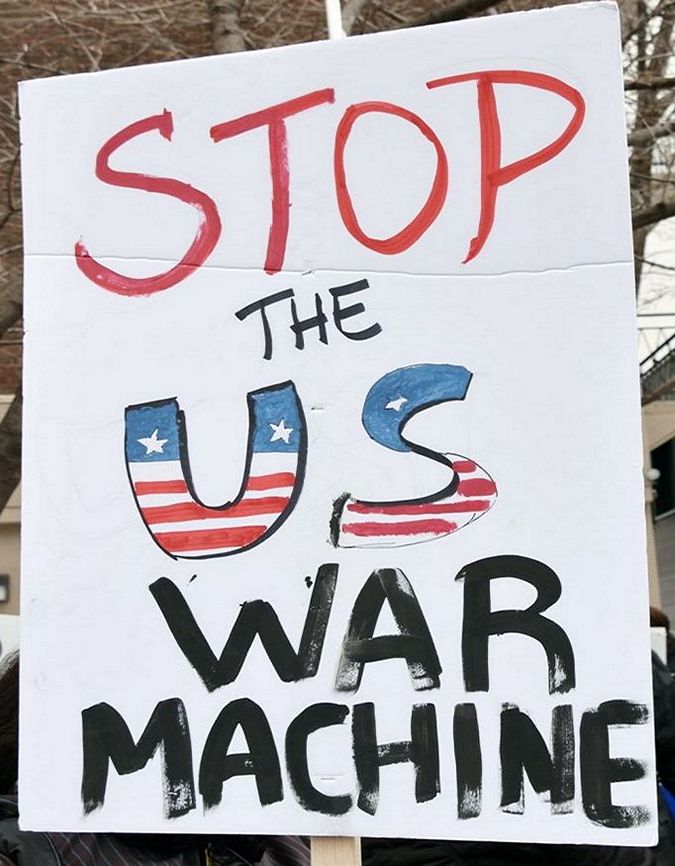 "The generators
that produce electrical power for aircraft all contain samarium-cobalt
magnets. The stealth technology that produces white noise to help
conceal the sound of helicopter rotor blades uses such magnets as well.
F-22 tail fins and rudders move due to motors with powerful, miniature
REE magnets. Electronic warfare jamming devices use rare-earth
materials, as do laser targeting systems and nascent laser weapons.
"The generators
that produce electrical power for aircraft all contain samarium-cobalt
magnets. The stealth technology that produces white noise to help
conceal the sound of helicopter rotor blades uses such magnets as well.
F-22 tail fins and rudders move due to motors with powerful, miniature
REE magnets. Electronic warfare jamming devices use rare-earth
materials, as do laser targeting systems and nascent laser weapons.
"Each stealthy F-35 strike fighter requires 920 pounds of rare-earth material, according to DOD [U.S. Department of Defense]. Each Arleigh Burke DDG-51 destroyer requires 5,200 pounds. An SSN-774 Virginia-class submarine needs 9,200 pounds."[1]
Defense Metals CEO Taylor sees the significance of the Wicheeda resource to military applications, adding, "We're seeing investment from the DOD and DOE [U.S. Department of Energy], but not enough at this point."
Enter Canada to help bridge the gap. It is a Canada which pays the rich and has integrated its economy into the U.S. war economy. This Canada does not bode well for the future. The direction given to the economy does not show that future developments will be favourable to the Indigenous Peoples who are the guardians of their unceded territories in British Columbia or to the Canadian people whose deepest desire is for the social and natural environment to be humanized, not dedicated to wars of aggression and the enrichment of a few people.
Note
1. "Rare-Earth Uncertainty" by Peter Grier, published in Air Force Magazine, December 21, 2017.
(With files from Natural Resources Canada, Northern Miner, Mining.com, Defense Metal, Air Force Magazine, LinkedIn. Photos: TML, Lheidli T'enneh)
NATO's Friends of Women, Peace and Security Group
Canada's Machiavellian Position on Women
One of the Trudeau government's big assertions since coming to power in 2015 is that it champions the rights of women, both at home and abroad. Given its treatment of women's claims on society, nobody believes that this is anything more than identity politics posturing. Evidence of what the assertion in fact means shows the government to be machiavellian indeed.
Machiavelli was the Renaissance philosopher who wrote things such as "It is much safer to be feared than loved" and "If an injury has to be done to a man it should be so severe that his vengeance need not be feared." According to Wikipedia, "When Machiavelli's first works were published, they were seen by some to be dangerous and amoral, and the word machiavellian was coined." It adds that "[m]odern psychiatrists even use it to describe a kind of personality disorder, a cold selfishness."
 The Trudeau
government, among other things, claims to be a leader in implementing
the Women, Peace and Security agenda adopted by the UN Security Council
in 2000, and that it is the "de facto leader" of the
NATO Friends of Women, Peace and Security group. Even as it fuels wars
of aggression and occupation, it claims that its agenda for Women,
Peace and Security recognizes the important role of women in the
prevention and resolution of conflicts, peace negotiations,
peace-building, peacekeeping, humanitarian response and in
post-conflict reconstruction. It stresses the importance of their equal
participation and full involvement in all efforts for the maintenance
and promotion of peace and security.
The Trudeau
government, among other things, claims to be a leader in implementing
the Women, Peace and Security agenda adopted by the UN Security Council
in 2000, and that it is the "de facto leader" of the
NATO Friends of Women, Peace and Security group. Even as it fuels wars
of aggression and occupation, it claims that its agenda for Women,
Peace and Security recognizes the important role of women in the
prevention and resolution of conflicts, peace negotiations,
peace-building, peacekeeping, humanitarian response and in
post-conflict reconstruction. It stresses the importance of their equal
participation and full involvement in all efforts for the maintenance
and promotion of peace and security.
Canada is the handmaiden of U.S. imperialism. It has placed women in three key ministries, besides others -- foreign affairs, defence, and finance, whose minister doubles as Deputy Prime Minister. To their shame, these ministers toe the line of integration into the U.S. war economy and armed forces and do yeoman's service for U.S. imperialist striving for world domination through NATO.
What NATO says regarding what it means by women's "participation" is perfectly clear. Speaking at the NATO Committee on Gender Perspectives Annual Conference (NCGP) on December 7, 2021, NATO Deputy Secretary General Mircea Geoan said, "The Women, Peace and Security agenda is partly about increasing the representation of women at every level, on both the political and the military side, from more female boots on the ground, to more seats for women at NATO's table in positions of leadership. As I mentioned last year, the numbers are going in the right direction, but we still have a long way to go."
In response, the Canadian Armed Forces' action plan for Women, Peace and Security restated its aims to increase the number of women in the armed forces from 15 per cent in 2016 to 25 per cent in 2026, and to put more women in leading positions in NATO. For its part the RCMP plan calls for more Canadian women police in high positions in international operations.
As part of its Friends of Women, Peace and Security agenda, NATO hosts a Civil Society Advisory Panel which held its fourth annual meeting in 2019. It also hosts frequent unreported meetings. The aim of the panel is said to be to find out what women think of NATO, how women view certain questions of security and defence, and women's thoughts about their own security needs.
Of course, no NATO panel or government official at any level ever takes the word of all the Canadian women in whose name they speak. The information, NATO says, will be used in "refining NATO's external communications strategies vis-à-vis female audiences in particular." In other words, how to convince women to support NATO's aggression and war, or at least to neutralize women's opposition.
Members of the panel are said to represent "civil society" but what exactly does this mean? A representative of Forum Dvorah, a Zionist organization which seeks to increase women's participation in the genocidal Israel Defense Forces (IDF), is a member of the Panel. An organization which claims to represent the women of Ukraine and is beating the drums of war and speaking of "confronting Russian aggression," is also a member. These are just two examples. Canada's Finance Minister and Deputy Prime Minister Chrystia Freeland herself is proud of the achievements of her Nazi-collaborator Ukrainian grandfather.
NATO's "table" it turns out is not a peace table at all. It is all about recruiting women for imperialist war. NATO is an aggressive military-political alliance conceived and brought into being in 1949 based on the Cold War claim that it was defending Europe and the "western world" against the "threat of communism." Then it was recast as "fighting terrorism" and now the threat of "Russian aggression" is front and centre. In all of this, Canada acts as the appeaser of U.S. aggression. Its pragmatic leadership, in true machiavellian fashion, is self-serving, unscrupulous and underhanded, and it fools no one.
Canadian Minister of Foreign Affairs Mélanie Joly went on a whirlwind tour of Europe the week of January 16 to 22. Her first stop was Kyiv, Ukraine, where the Minister met with Prime Minister Denys Shmyhal and Deputy Prime Minister for European and Euro-Atlantic Integration Olga Stefanishyna. She went on to meet with Jean-Yves Le Drian, France's Minister for Europe and Foreign Affairs; Sophie Wilmès, Belgium's Deputy Prime Minister and Minister of Foreign Affairs; Jens Stoltenberg, NATO Secretary General; and Josep Borrell, High Representative of the European Union for Foreign Affairs and Security Policy.
Global Affairs Canada hailed the tour as Canada being "actively engaged with our U.S. and European partners as part of coordinated efforts to deter further Russian aggression against Ukraine and to encourage de-escalation."
It would be more accurate to describe it as Canada being the handmaiden of the Biden administration to shore up support for the dangerous game the U.S. is playing at the expense of Ukraine and all of Europe, in its contention with Russia.
Minister Joly wasted no time in briefing U.S. Secretary of State Antony Blinken on her meetings. On January 22, the very day of her return she tweeted, "We shared perspectives on our trips to Europe and agree that Russia must de-escalate & stop any further aggression. Canada is fully engaged on the diplomatic front and actively working with allies."
Is this an example of women preventing and resolving conflicts, of negotiating, building and keeping peace, and of a humanitarian response? No. It makes a mockery of the demands for peace of the women of Canada and the world.
The Minister's tour came precisely as the U.S. announced a further $200 million in sales and shipments of lethal weapons to Ukraine and Prime Minister Trudeau has announced that Canada will lend the Ukraine government $120 million. Trudeau said only, "This loan will help support Ukraine's economic resilience" and that "we're also exploring other options to provide financial and other supports." The money may well go to help Ukraine pay for lethal weapons purchased from the U.S.
 If Canada was on
a mission of peace and stability it would have made sense to stop for
talks in Moscow as well. The Minister was given an open invitation for
talks by the Russian Foreign Minister back in December 2021. Russia's
Ambassador to Canada Oleg Stepanov remarked upon Joly's return, "Canada
is a really vocal player right now in NATO camp, in the situation
around Ukraine" and encouraged Canada to take up the offer to talk
peace with Russia.
If Canada was on
a mission of peace and stability it would have made sense to stop for
talks in Moscow as well. The Minister was given an open invitation for
talks by the Russian Foreign Minister back in December 2021. Russia's
Ambassador to Canada Oleg Stepanov remarked upon Joly's return, "Canada
is a really vocal player right now in NATO camp, in the situation
around Ukraine" and encouraged Canada to take up the offer to talk
peace with Russia.
The warmongering of the Trudeau war government will not smell sweeter because women are its spokespersons. On the contrary, it serves as a great reminder that women from coast to coast to coast must stand in the front ranks of making Canada a zone for peace and establish an anti-war government in which they themselves and all Canadians can speak in their own name!
No to Use of Force to Settle International Conflicts!
U.S. and Allies Ramp Up Lethal Weapons Shipments to Ukraine

Shipment of U.S. arms
arrives in Ukraine, January 24, 2022 (D. O'Brien)
The U.S. and some of its allies have been ramping up shipments of lethal armaments to Ukraine to fuel the crisis within that country and to provoke conflict with Russia. The increased arms shipments took place when U.S. Secretary of State Blinken was in Geneva on January 21, allegedly to discuss de-escalating the Ukraine crisis with Russian Foreign Minister Sergei Lavrov.
The
Biden administration handed over five Russian-made Mi-17 transport
helicopters, already in Ukraine for servicing, to the Ukrainian
government. The U.S. has already begun the transfer of some $200
million in ammunition and other military hardware to Ukraine. This
includes delivery of eight shipments of hundreds of tons of lethal
weapons, including hundreds of Lockheed Martin shoulder-fired Javelin
anti-tank missiles, launchers and other supplies. Another $500 million
in lethal weapons and spyware is in the works. The transfer of
U.S.-made military hardware from Estonia, Lithuania and Latvia to
Ukraine was also approved.
Included in the arms shipments are artillery reconnaissance systems, signals intelligence, electronic warfare systems and drones, a shipment of anti-tank missile systems from Britain, as well as counter artillery radar, ammunition and patrol boats.
All this lethal weaponry in the hands of Ukrainian armed forces, and particularly the neo-Nazi militias like the Azov Battalion and others, is for committing aggression against Ukraine's own citizens and to drown the Ukrainian civil conflict in blood, rather than sorting out problems by putting the interests of the people for a peaceful solution at the centre of concerns. It is to whip up divisions among Ukrainians, targeting citizens of Russian ethnic origin in the Donetsk and Lugansk regions which border on Russia. It is also to drag Ukraine into U.S. provocations and aggression against Russia.
Notably, among other U.S. allies and NATO members, there is not unanimity about the U.S. gunboat diplomacy. Germany, for example, blocked the transfer of German-made weapons from Estonia to Ukraine.
A space for actual diplomacy exists to ensure there is no further bloodshed and that the conflict is resolved without recourse to military force. This was underscored by the head of the German Navy, Vice Admiral Kay-Achim Schönbach. He resigned on January 22 after making public statements against fueling conflict between Ukraine and Russia. "The Crimea Peninsula is gone," he said. "It will never come back -- this is a fact." He also called for respect for Russia's concerns raised by President Putin. He said: "Giving someone respect is low cost, even no cost. ... It is easy to give him the respect he really demands -- and probably also deserves."
Criminal U.S. Raid Against Syria
On February 3, President Biden announced that the U.S. had carried out a raid in northwestern Syria. The U.S. is not at war with Syria. Besides the raid being unconscionable, such raids are illegal, contrary to international law and unacceptable violations of Syria's sovereignty. The U.S. has usurped the role of judge, jury and executioner and justifies such attacks in the name of fighting terrorism. In this case, Biden said the raid targeted an ISIS leader, Abu Ibrahim al-Hashimi al-Qurayshi.
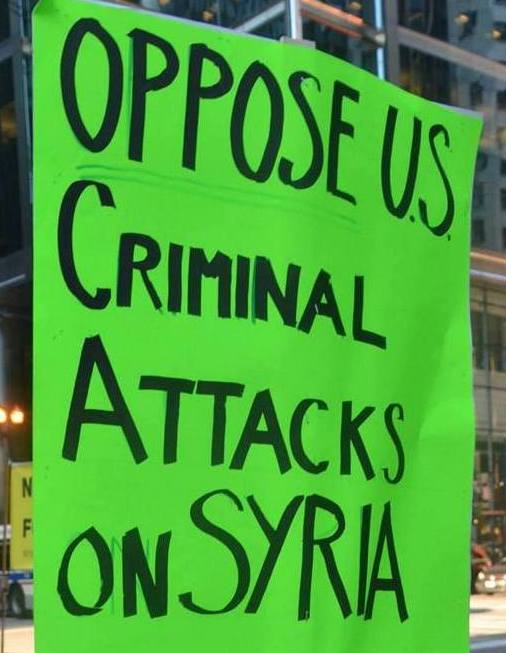 According to
reports, the attack involved helicopters and U.S. Special Forces on the
ground. Numerous explosions were reported. The U.S. considers the
operation a "success" because there were no U.S. casualties and
al-Qurayshi was killed. Other reports indicate that at least 13
civilians including six children and four women were also killed,
bodies scattered everywhere, and a building and surrounding olive grove
decimated.
According to
reports, the attack involved helicopters and U.S. Special Forces on the
ground. Numerous explosions were reported. The U.S. considers the
operation a "success" because there were no U.S. casualties and
al-Qurayshi was killed. Other reports indicate that at least 13
civilians including six children and four women were also killed,
bodies scattered everywhere, and a building and surrounding olive grove
decimated.
In a disgusting show of hubris, Biden threatened: "This operation is testament to America's reach and capability to take out terrorist threats no matter where they try to hide anywhere in the world... Last night's operation took a major terrorist leader off the battlefield. And it sent a strong message to terrorists around the world: We will come after you and find you."
In fact, this is a further indication that the U.S. makes the rules, decides who is and who is not a terrorist and uses tactics which blow up women, children and other civilians claiming they are dispensable collateral damage. It is also evidence of U.S. desperation and of the character of its "rules-based order" which is based on issuing threats in the hopes it will achieve submission and surrender. In Biden's mind, he may even think he is sending a warning to Russia to watch out. In any case, it is not about terrorists at all, but directed against any who stand up against U.S. aggression and occupation.
This also violates United Nations standards and international law, which is also U.S. law, which prohibits aggression and interference in other countries' internal affairs and upholds the sovereignty of nations.
The people of Syria have successfully blocked U.S. efforts at regime change, which include funding, arming and protecting various internal pro-U.S. forces. The Syrians -- not the U.S. -- are also the ones who have blocked and defeated ISIS in most of their country. They are an ancient people, with high moral standards and a strong culture of resistance.
The U.S. knew that many women and children were in the building when it carried out the raid. They knew it but did so anyway. The U.S. claims al-Qurayshi caused the casualties by detonating a blast strong enough to blow up an entire floor but there is no evidence of that. The U.S. also says it removed another eight children from the site, making at least 14 children present when the U.S. launched the raid, since at least six were killed.
"Our forces carried out the operation with their signature preparation and precision, and I directed the Department of Defense to take every precaution possible to minimize civilian casualties," Biden said.
 The world is very
familiar with U.S. precautions. Drone attacks and raids by Special
Forces have killed whole wedding parties and an untold numbers of
civilians and the U.S. always denies responsibility. The latest example
was the drone attack against civilians in Afghanistan during the
chaotic U.S. evacuation. Even Pentagon head Lloyd Austin, speaking
about the raid against Syria, admitted, "Given the complexity of this
mission, we will take a look at the possibility our actions may also
have resulted in harm to innocent people."
The world is very
familiar with U.S. precautions. Drone attacks and raids by Special
Forces have killed whole wedding parties and an untold numbers of
civilians and the U.S. always denies responsibility. The latest example
was the drone attack against civilians in Afghanistan during the
chaotic U.S. evacuation. Even Pentagon head Lloyd Austin, speaking
about the raid against Syria, admitted, "Given the complexity of this
mission, we will take a look at the possibility our actions may also
have resulted in harm to innocent people."
The bottom line is that whatever people at the compound did or did not do, it is the U.S. that conducted the raid and is responsible for the killings.
Reality shows the worldwide U.S. war of terrorism with its illegal and unjust drone strikes and Special Operations raids, many against Syria, has solved no problem. U.S. actions have deepened the state of anarchy and violence which prevails, has brought untold deaths and destruction and forced people from their homes to become refugees. This latest action is no different.
Besides other things, Biden said that the U.S. has known for months about al-Qurayshi, stating "I want to commend our dedicated intelligence community, the Department of Defense, and members of our national security team throughout the government whose meticulous and tireless work over the course of many months ensured that this mission succeeded." The Pentagon says Biden was briefed on the operation more than a month ago and again more recently.
The question must be asked, why now?
The raid took place in the context of repeated U.S. provocations and threats against Russia in the name of "defending" Ukraine. These include moving warships and bombers to the area and together with NATO stationing more troops and missiles in the region. Biden also put 8,500 U.S. troops on heightened alert. Then on February 2, a day before the raid, Biden approved sending 3,000 more troops to be stationed in Poland, Romania and Germany. Poland and Romania both border Ukraine. These troops are in addition to the more than 35,000 U.S. troops already in Germany. The U.S. also still has 1,000 troops in Syria
Unlike the U.S. which has more than 750 military bases worldwide and an estimated 200,000 troops stationed abroad, Russia only has a base in the western part of Syria. It includes a main air base in Hmeimim and the naval port of Tartus. The U.S. raid was carried out further north, in the western part of the country.
The timing is hardly a coincidence but rather part of U.S. threats and provocations against Russia. All the focus on opposing terrorism is a means to hide this and hide U.S. responsibility for its many crimes against Syria and dangerous war games against Russia. Diplomacy, as Russia and peoples in the U.S. and worldwide have been calling for, is required.
Communist Party of Brazil
Red Salute to Longtime Fighter for
Democratic Rule in Brazil!
 With deep sorrow,
the Communist Party of Canada (Marxist-Leninist) learned of the death
of Maria Prestes on February 4, at 92 years of age, due to
complications caused by COVID.
With deep sorrow,
the Communist Party of Canada (Marxist-Leninist) learned of the death
of Maria Prestes on February 4, at 92 years of age, due to
complications caused by COVID.
A revolutionary militant since her youth, Maria Prestes was the widow of Communist leader Luiz Carlos Prestes, the legendary "Knight of Hope," with whom she lived for about four decades.
Her fruitful life was dedicated to socialism, to preserving and disseminating Prestes' legacy, and to taking care of her family, with kindness and zeal.
Maria Prestes leaves nine children, 25 grandchildren and 25 great-grandchildren, among them her granddaughter, comrade Ana Maria Prestes, a national cadre of the Communist Party of Brazil (PCdoB).
We join the PCdoB in tilting our red flag in tribute to Maria Prestes. The PCdoB wrote about this remarkable communist, woman and human being that, for her "the greatest homage will be the continuity of the struggle for a sovereign, democratic and socialist Brazil."
Communist Party of Vietnam
Long Live Revolutionary Vietnam
on
Its 92nd Anniversary!
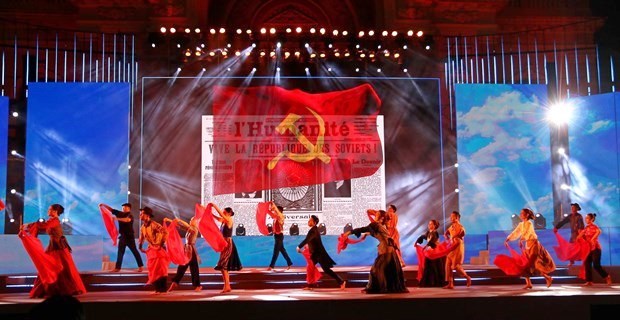
Cultural performance in
Ho Chi Minh City, February 3, 2022, celebrates the 92nd anniversary of
the founding of the Communist Party of Vietnam. (VNA)
February 3 marks the historic 92nd anniversary of the founding of the Communist Party of Vietnam (CPV) by the legendary leader of the Vietnamese people, President Ho Chi Minh. The Communist Party of Canada (Marxist-Leninist) salutes the CPV on this occasion and sends its warmest revolutionary greetings to the General Secretary of its Central Committee and President of the Republic, Nguyen Phu Throng and, through him, to all Party members and the heroic Vietnamese people on all their accomplishments.
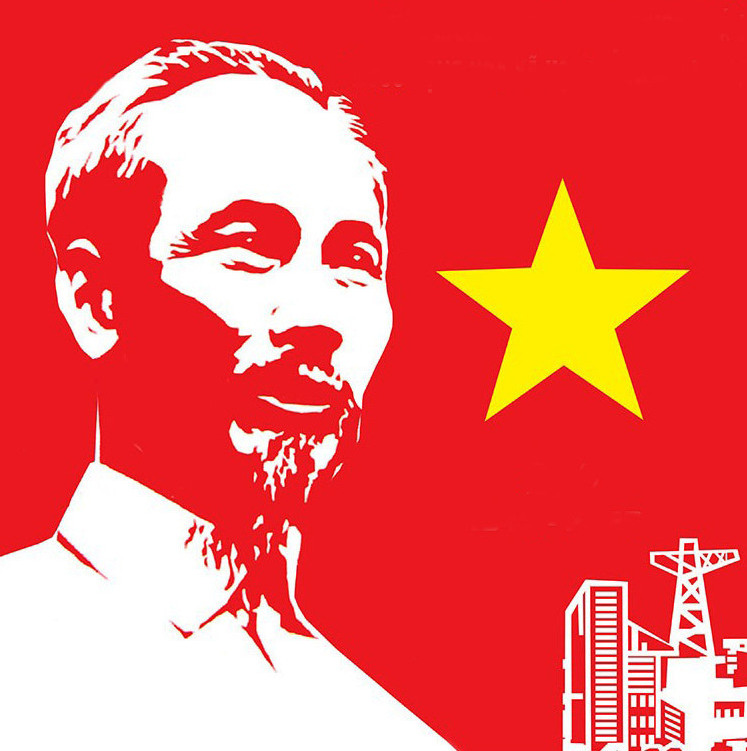 We honour the
memory and legacy of the legendary leader and the initial architect of
modern Vietnam, President Ho Chi Minh; pay tribute to all those who
sacrificed their lives to achieve victory in the protracted national
liberation war against first French colonialism and then U.S.
imperialism; and are greatly inspired by the feats the current
generations are achieving by tackling great difficulties and challenges
and providing solutions in a manner which favours the peoples of
Vietnam and the world.
We honour the
memory and legacy of the legendary leader and the initial architect of
modern Vietnam, President Ho Chi Minh; pay tribute to all those who
sacrificed their lives to achieve victory in the protracted national
liberation war against first French colonialism and then U.S.
imperialism; and are greatly inspired by the feats the current
generations are achieving by tackling great difficulties and challenges
and providing solutions in a manner which favours the peoples of
Vietnam and the world.
On this occasion, TML Monthly is publishing a report on the National Foreign Relations Conference the CPV held in December 2021. The aim of the Conference was to discuss the implementation of the Resolution of the 13th National Congress of the CPV held January 25 to February 1, 2021. The report highlights some of the main points of the speech delivered at the Conference by CPV General Secretary Nguyen Phu Throng.
The report on the National Foreign Relations Conference was presented by Philip Fernandez at a meeting organized by the Canada-Vietnam Friendship Society on January 23 to mark the occasion of the 92nd anniversary of the founding of the CPV.
Vietnam's Principled and
Constructive
Foreign Policy
The National Foreign Relations Conference for the Implementation of the Resolution of the 13th National Party Congress of the Communist Party of Vietnam (CPV) was held in December 2021. This was the first-ever National Foreign Relations Conference held by the CPV to discuss Vietnam's foreign policy. It was organized by the Politburo and the Secretariat of the CPV's Central Committee specifically for implementation of the guidelines on external affairs adopted at its 13th Congress.
The 13th Congress of the CPV resolved to implement an ambitious program. Among other things, it set that by 2030 -- the centenary of the Party -- Vietnam will be a developing country with a modern-oriented industrial base and upper-middle income; and by 2045 -- the centenary of the Democratic Republic of Vietnam, which preceded the Socialist Republic of Vietnam -- it will be a developed, high-income, socialist society.
The guidelines adopted at the 13th Congress on external affairs:
- stressed that Vietnam would continue to implement its longstanding foreign policy doctrine of independence, self-reliance, diversification, and multilateralization;
- reaffirmed Vietnam's commitment to continue being a trusted friend and partner, and a responsible and proactive member of the international community;
- highlighted the key role and important contributions of external affairs to national construction, defence and development; and
- recognized the diplomatic sector's pioneering role, with three main objectives:
1) creating and maintaining a peaceful and stable environment;
2) mobilizing outside resources to develop the country; and
3) improving Vietnam's position and prestige.
This approach taken by the 13th Congress of putting the foreign diplomacy concerns and priorities of the nation on the agenda of the Party and the entire nation is a compelling refutation of the propaganda we hear from ruling circles equating communism and communist parties with authoritarianism. It stands in stark contrast to countries based on the Westminster parliamentary system, called representative, where matters as serious as war and peace are matters of state secrecy over which even elected members of parliament have no say. In these countries external affairs also have a close link to the economy, not in a manner based on mutual benefit, but one that serves narrow private interests and is used to justify aggression and war.
| |
In his remarks to the Conference in December 2021, General Secretary of the CPV Phu Trong Nguyen said, "The Conference today is of great significance (and as some comrades have put it, an historic one) as it is the first-ever National Foreign Relations Conference held under the direct instruction of the Politburo and Secretariat in order to discuss Party external relations, State diplomacy, people-to-people diplomacy and the whole political system."
He said the Conference was taking place at a time "when the entire Party, people and army are redoubling our efforts to translate the Resolution of the 13th National Party Congress into reality;" when "our country is presented with many opportunities and advantages, and at the same time confronted with new, fiercer hardships and challenges than we had previously predicted."
"The requirements of the nation-building and national defence mission are extremely high in the new era." This Conference he said, "will also be an opportunity for the various levels, sectors, localities and the diplomatic sector to grasp a better understanding of Vietnam's current landscape and standing vis-à-vis the region and the world, and how significant and important foreign relations are within the overall strategy for nation-building and defence, and bring about renewed spirit, determination and driving force for the entire political system, all levels, sectors, each and every organization and individual involved in foreign relations."
Foreign Affairs Policy Richly Imbued with National Identity
General Secretary Nguyen emphasized that Vietnam's foreign policy is deeply steeped in the history and thought material of the Vietnamese people. He said, "Throughout our people's history over thousands of years, independence, self-reliance and maximizing the interest of the nation-state have always been an unchangeable principle and the overarching line in our every action."
"Diplomacy has ever been resorted to to prevent and ward off war, or to put an end to war in as advantageous a position as possible. It must always be in service of domestic policies, nation-building and national development. These philosophies of our forefathers are well ahead of their time and eternally relevant," he added.
"These excellent traditions and virtues have been further built on and advanced and shine brightly in the Ho Chi Minh era, and evolved into a modern Vietnamese diplomatic service richly imbued with the national identity," he said. "President Ho Chi Minh laid the foundation and directly led and guided the development of the Vietnamese revolutionary diplomatic service."
"The fundamental elements of Ho Chi Minh Diplomatic Thought stem from the philosophy and tradition of diplomacy employed by our forefathers, and it was President Ho Chi Minh himself who developed these values to a higher level, seamlessly combining patriotism, national culture and Vietnamese diplomatic traditions with the quintessence of world culture and diplomatic experience," he pointed out.
"President Ho Chi Minh never wished for Vietnam to suffer war, nor did he wish war upon others," the General Secretary said. "It is this humanistic and humanitarian philosophy of President Ho Chi Minh, in which justice and truth are upheld in the interest of peace, independence, freedom and happiness to all peoples and all nations, that is the embodiment of the seamless combination between the culture of our nation and that of mankind."
"Over the past 35 years of Doi Moi [Renewal], inheriting and building upon the prideworthy diplomatic traditions of the nation, especially the philosophy of President Ho Chi Minh, who paved the way for Vietnamese diplomacy in the Ho Chi Minh era, our Party has taken upon itself to continually add to, cultivate and augment the foreign policy orientations of independence, self-reliance and openness in the interest of peace, cooperation and development. Our foreign policy is multilateralization, diversification, and active and proactive international integration," the General Secretary said.
Doi Moi Era
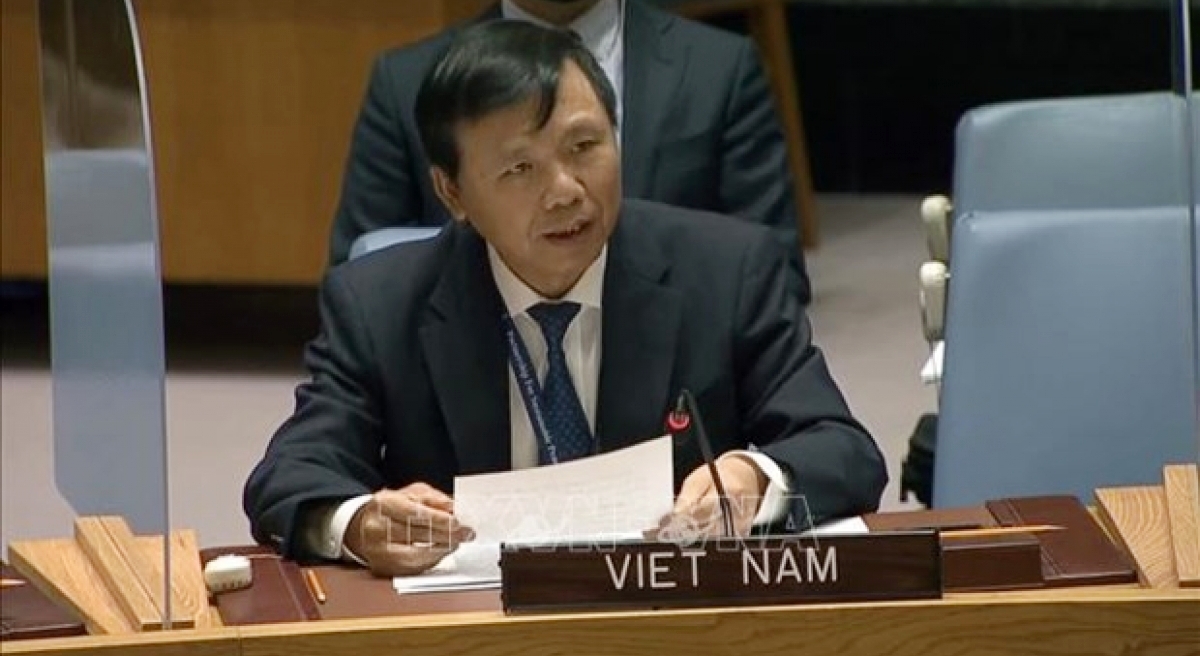 Ambassador Dang Dinh Quy, Permanent
Representative of the Socialist Republic of Vietnam to the UN speaking
on the need to reform the UN Security Council at UN meeting
Ambassador Dang Dinh Quy, Permanent
Representative of the Socialist Republic of Vietnam to the UN speaking
on the need to reform the UN Security Council at UN meeting
November 24, 2021.
General Secretary Nguyen pointed out that this historic legacy laid down by Ho Chi Minh, has propelled Vietnam's diplomatic service as "a trailblazer, a builder of new paths, a pioneer in breaking out of isolation and embargo, and the forerunner in opening up relations with many partners and bringing about a new landscape for the processes of Doi Moi, international integration, nation-building and national defence."
The accomplishments speak for themselves:
- Vietnam enjoys diplomatic relations with 189 of the 193 members of the United Nations.
- Vietnam is an active and responsible member of more than 70 international organizations and forums of importance, such as the United Nations, Association of Southeast Asian Nations (ASEAN), Asia-Pacific Economic Cooperation (APEC), Asia-Europe Meeting (ASEM) and World Trade Organization (WTO), to name a few.
- The CPV has forged ties with 247 political parties, including 90 Communist and Workers' parties all over the world, ruling parties and politically active parties.
- Vietnam's National Assembly enjoys parliamentary relations with its counterparts in 140 countries, and is an active participant at many important international parliamentarian forums.
- The diplomatic work conducted by the Vietnamese government across the political, defence, security, economic and socio-cultural pillars has been advanced.
- Mass friendship organizations have also engaged in foreign relations in a concrete way, enriching the friendship between the Vietnamese people and the peoples of the world.
- Vietnam has created an international environment and mustered resources from outside conducive to accelerating industrialization, modernization and socio-economic development.
- Vietnam has been able to call on the international community for support in terms of vaccines, medical supplies and treatment drugs, a key contribution to the fight against the pandemic and socio-economic recovery and development. More than 172.7 million doses of COVID-19 vaccine have been administered in the country to date, with 73.9 per cent of the population fully vaccinated.
- While just 30 years ago Vietnam had economic and trade ties with only some 30 countries and territories, today the number is 230.
- Total foreign trade turnover this year is approximately U.S.$600 billion, about 120 times the figure of the early years of Doi Moi.
- Vietnam's international standing and prestige in the region and the world are constantly on the rise, and Vietnam makes active and very responsible contributions to the maintenance of peace and cooperation for development and progress in the world.
These are but a few of the accomplishments of Vietnam. The General Secretary emphasized: "These gains and achievements are thanks to the correct, wise, measured and conscious leadership of the Party Central Committee and the direct guidance of the Politburo and Secretariat; the active and flexible administration of the State, the consensus, solidarity and support of the entirety of our people."
Guidelines for Today's Conditions
General Secretary Nguyen then went on to discuss the international climate within which Vietnam is charting its course.
"In the upcoming years, we project that the situation in the world and region will continue to witness very rapid, complex and unpredictable changes. Peace, cooperation and development remain the major trends, yet they will also face many obstacles, difficulties and challenges. Globalization and international integration will continue to move forward, yet they will also be threatened by the emergence of extreme nationalism, and fierce strategic rivalries, economic competition and trade war.
"Due to the COVID-19 pandemic, the world is falling into a serious crisis in many regards. The Fourth Industrial Revolution is developing robustly, creating breakthroughs in many areas, thus bringing about both opportunities and challenges to every nation. Countries are adjusting their development strategies and methods in order to adapt to the new reality. The Asia-Pacific continues to become an all the more important and strategic area. In Southeast Asia, the security environment and sovereignty disputes in the East Sea will continue to develop in complex ways."
Bearing these conditions in mind, General Secretary Nguyen elaborated six areas of work the Party has identified as of particular importance to the realization of the foreign policy guidelines adopted at the 13th Congress.
1. The importance of paying attention to and developing a proper understanding of unfolding global events, which in the words of General Secretary Nguyen have "gone beyond the parameters of conventional forecasting."
2. To implement Vietnam's foreign policy based on independence, self-reliance, peace, cooperation and development to ensure political stability within the country as well as safeguard Vietnam's sovereignty and territorial integrity.
3. To continue building on Vietnam's active participation in multilateral and international organizations, including the UN, ASEAN and other fora.
4. To expand and develop the effectiveness of Vietnam's economic, cultural, political, security and defence cooperation with other countries starting with neighbours, as well as with major powers. Vietnam will give priority to expanding market access for Vietnamese goods, services and workers and to attracting financing, technology, managerial expertise and direct foreign investment.
Strengthening relations with the close to 5 million Vietnamese in the diaspora is important to Vietnam's nation-building project. Vietnam also works to secure their well-being in their countries of residence and provides assistance to maintain their Vietnamese language, heritage and identity.
5. Improve Vietnam's ability to assess the impetus of the Fourth Industrial Revolution and digital transformation which is driving enormous changes. Factors such as global epidemic and climate change will also be closely monitored.
Ensuring the requirements for strategic research and forecasting are extremely important. The General Secretary called on the delegates to pay close attention to the content of the complexities as events unfold. He stated: "As I usually say: ‘The only thing to fear is not knowing; once we know, there is no fear.’"
6. Finally, recognizing the importance of foreign diplomacy to realizing the nation-building work set by the 13th Congress, close attention is paid to selection and ideological training of cadre and personnel involved in diplomatic affairs and Foreign Service.
General Secretary Nguyen concluded his remarks recognizing that the world is changing rapidly. While hardship remains on our country's path, he said, our prospect is very bright. Our entire Party, people and army are standing together, with the highest resolve, to realize the Resolution of the 13th National Party Congress. Every Vietnamese, whether at home or abroad, desires our country to grow mighty and prosperous, to stand side-by-side with the peoples of the five continents, as was the aspiration of President Ho Chi Minh.
(Edited slightly for publication. Photos: VNA, Baoqoucte)
(To access articles individually click on the black headline.)
Website: www.cpcml.ca Email: editor@cpcml.ca
 To determine what
is happening it is necessary to recognize that a great conflict is
taking place between two fundamental outlooks; one which is
counterrevolutionary and fights to preserve the status quo and the
positions of privilege and power and another which is revolutionary and
fights to bring in the New and open a path for society to progress.
Only if the situation is looked at from the point of view that reveals
the need for change, progress and the advancement of society can the
status quo of anarchy and violence be ended and the retrogression be
stopped. Only the working class and people have an interest to do that.
In this regard, it really does not matter anymore what "ism" a person
or an organization espouses. What matters is whether the outlook of the
fighting forces is consistent with the demands of the times and they
are acting in a manner which provides solutions that favour the
peoples. Without this, putting labels on things -- including ideologies
-- is meaningless. It is not just meaningless but in fact it is
harmful. It stops people looking at the reality because they are too
busy getting incited, cursing one another and hoping the cartel
parties, courts and agencies of law and order will sort out the
problems in a manner which favours them.
To determine what
is happening it is necessary to recognize that a great conflict is
taking place between two fundamental outlooks; one which is
counterrevolutionary and fights to preserve the status quo and the
positions of privilege and power and another which is revolutionary and
fights to bring in the New and open a path for society to progress.
Only if the situation is looked at from the point of view that reveals
the need for change, progress and the advancement of society can the
status quo of anarchy and violence be ended and the retrogression be
stopped. Only the working class and people have an interest to do that.
In this regard, it really does not matter anymore what "ism" a person
or an organization espouses. What matters is whether the outlook of the
fighting forces is consistent with the demands of the times and they
are acting in a manner which provides solutions that favour the
peoples. Without this, putting labels on things -- including ideologies
-- is meaningless. It is not just meaningless but in fact it is
harmful. It stops people looking at the reality because they are too
busy getting incited, cursing one another and hoping the cartel
parties, courts and agencies of law and order will sort out the
problems in a manner which favours them. The habit of
asserting the superiority of one belief over another, or one person or
party over another, or of implementing policies, decisions and
practices which declare some peoples or countries dispensable and
others indispensable are all used to make sure the struggles of the
peoples do not make headway. But the peoples are laying the claims on
society which they must and this is the way forward. Meanwhile, the
rulers are out of control. They cannot control the contradictions
within their own ranks which are erupting in violent acts whose
suppression escapes them.
The habit of
asserting the superiority of one belief over another, or one person or
party over another, or of implementing policies, decisions and
practices which declare some peoples or countries dispensable and
others indispensable are all used to make sure the struggles of the
peoples do not make headway. But the peoples are laying the claims on
society which they must and this is the way forward. Meanwhile, the
rulers are out of control. They cannot control the contradictions
within their own ranks which are erupting in violent acts whose
suppression escapes them.

 An organization
called Canada Unity claims to be the organizer of the convoy. It is
demanding the resignation of the Trudeau government, an end of all
mandates and that the Senate and Governor-General recognize their group
as representatives of "the people of Canada." Besides pushing their
ideological beliefs in the name of freedom and democracy with the aid
of not a few advocates of racism and misogyny, a cabal of Conservative
Party MPs and those involved in their own causes, such as the so-called
People's Party of Maxime Bernier and other such formations, they do not
permit any discussion on the working and living conditions of truckers
in Canada. For the media to call it a truckers' convoy is a misnomer to
say the least.
An organization
called Canada Unity claims to be the organizer of the convoy. It is
demanding the resignation of the Trudeau government, an end of all
mandates and that the Senate and Governor-General recognize their group
as representatives of "the people of Canada." Besides pushing their
ideological beliefs in the name of freedom and democracy with the aid
of not a few advocates of racism and misogyny, a cabal of Conservative
Party MPs and those involved in their own causes, such as the so-called
People's Party of Maxime Bernier and other such formations, they do not
permit any discussion on the working and living conditions of truckers
in Canada. For the media to call it a truckers' convoy is a misnomer to
say the least. This so-called
Freedom Convoy is organized, in the words of Ms. Lich, to get the
federal and provincial governments to end vaccine passports, all
mandatory vaccination requirements and contact tracing throughout
Canada and to respect the rights of those who wish to remain
unvaccinated. She claims that she is defending freedom and democracy
against what she calls the divisive rhetoric and the coercive measures
of governments to censor those who hold different opinions.
This so-called
Freedom Convoy is organized, in the words of Ms. Lich, to get the
federal and provincial governments to end vaccine passports, all
mandatory vaccination requirements and contact tracing throughout
Canada and to respect the rights of those who wish to remain
unvaccinated. She claims that she is defending freedom and democracy
against what she calls the divisive rhetoric and the coercive measures
of governments to censor those who hold different opinions. All of it -- the
divisive stunts and expenditure of vast amounts of money to pay for
policing, and the algorithms designed to portray "thousands" of rigs on
the march -- adds up to a massive disinformation campaign to hide the
fact that it is up to the Canadian people themselves, in action in
defence of the rights of all, to define what is democratic and what is
not, what is pro-social and what is not, what is needed and what is
not. All the hooting and hollering seems designed to imitate the
theatrics of the failed January 6, 2021 coup at the Capitol in
Washington DC so as to drown out the workers speaking in their own
names about what must be done regarding their living and working
conditions.[
All of it -- the
divisive stunts and expenditure of vast amounts of money to pay for
policing, and the algorithms designed to portray "thousands" of rigs on
the march -- adds up to a massive disinformation campaign to hide the
fact that it is up to the Canadian people themselves, in action in
defence of the rights of all, to define what is democratic and what is
not, what is pro-social and what is not, what is needed and what is
not. All the hooting and hollering seems designed to imitate the
theatrics of the failed January 6, 2021 coup at the Capitol in
Washington DC so as to drown out the workers speaking in their own
names about what must be done regarding their living and working
conditions.[ By February 2, in
just a few weeks, over $10 million was raised with no public
accountability. A few days earlier the Freedom Convoy 2022 GoFundMe
page showed the largest single donation to be $25,000, from an
anonymous donor, with several other five-figure amounts showing as
well. A note on the page at the time said only that "funds will be
spent to help cover the cost of fuel for our Truckers first and
foremost, will be used to assist with food if needed and contribute to
shelter if needed." For all Canadians know, the hotel industry in
Ottawa could have had something to do with organizing people to
converge in the city in the middle of a pandemic when business is slow.
By February 2, in
just a few weeks, over $10 million was raised with no public
accountability. A few days earlier the Freedom Convoy 2022 GoFundMe
page showed the largest single donation to be $25,000, from an
anonymous donor, with several other five-figure amounts showing as
well. A note on the page at the time said only that "funds will be
spent to help cover the cost of fuel for our Truckers first and
foremost, will be used to assist with food if needed and contribute to
shelter if needed." For all Canadians know, the hotel industry in
Ottawa could have had something to do with organizing people to
converge in the city in the middle of a pandemic when business is slow.
 The fact is that
Trudeau's intervention further divides the polity while claiming that
everyone's freedom of expression is protected so long as they do not
engage in violent acts. In this way he attempts to portray himself as
the hero who represents real freedom and democracy. What is covered up
by the fight over whose views on democracy are valid, is the support of
both sides for the integration of Canada into the U.S. economy and war
machine. Controlling energy corridors, building pipelines without
consent on Indigenous territories, manipulating regulatory regimes to
turn environmental standards and requirements on their head and
sacrificing the human and natural environment are par for the course
for both sides in this factional fight to control the federal power.
The fact is that
Trudeau's intervention further divides the polity while claiming that
everyone's freedom of expression is protected so long as they do not
engage in violent acts. In this way he attempts to portray himself as
the hero who represents real freedom and democracy. What is covered up
by the fight over whose views on democracy are valid, is the support of
both sides for the integration of Canada into the U.S. economy and war
machine. Controlling energy corridors, building pipelines without
consent on Indigenous territories, manipulating regulatory regimes to
turn environmental standards and requirements on their head and
sacrificing the human and natural environment are par for the course
for both sides in this factional fight to control the federal power.


